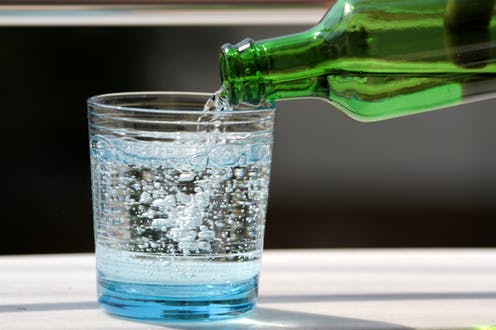
Is sparkling water bad for you?
Sparkling water is made by infusing water with carbon dioxide. This produces carbonic acid with a weak acidic pH of between three and four. That “feel good” mouth sensation you get after sipping a carbonated drink is in fact the chemical activation of pain receptors on your tongue responding to this acid, giving a moreish taste. And here’s part of the problem, as acid in drinks can harm our teeth.
The outer layer of our teeth, dental enamel, is the hardest tissue in the body. It is made of a mineral called hydroxyapatite that contains calcium and phosphate. Saliva is mainly water but also contains calcium and phosphate.
There is normally a balance between tooth minerals and the minerals in saliva. The mouth and saliva normally have (a pH of six to seven), but when this drops below five and a half, calcium and phosphate molecules move out of the teeth and into saliva. This can happen because of the carbonic acid in fizzy drinks.
This demineralization creates tiny pores in the tooth mineral and the enamel starts to dissolve. Initially, the pores are microscopic and can still be plugged by putting calcium or phosphate back in, or by replacing calcium with fluoride – this is how fluoride in toothpaste works to protect teeth. But once the amount of lost tooth mineral reaches a certain level, the pores can no longer be plugged and the tooth tissue is lost for good.
If teeth are bathed in acid from carbonated drinks frequently, more minerals can be dissolved out than get put back in, and there is more risk of tooth wear or erosion
So although plain sparkling water is better for your teeth than flavored sodas (diet or regular) which have a lower pH, still water is best – it has a pH of around seven. Incidentally, club soda is not only carbonated but has some “minerals” added for flavor. These may include sodium, so if you are watching your salt intake you also need to be mindful of this.
Water is a healthy and cheap choice for quenching your thirst at any time. It has no calories, is free and contains no sugars that can damage teeth – unlike the myriad of sports, energy and carbonated drinks that flood supermarket shelves.
So when it comes to trying to increase your fluid intake, water is still the preferred option.
 English
English Arabic
Arabic


